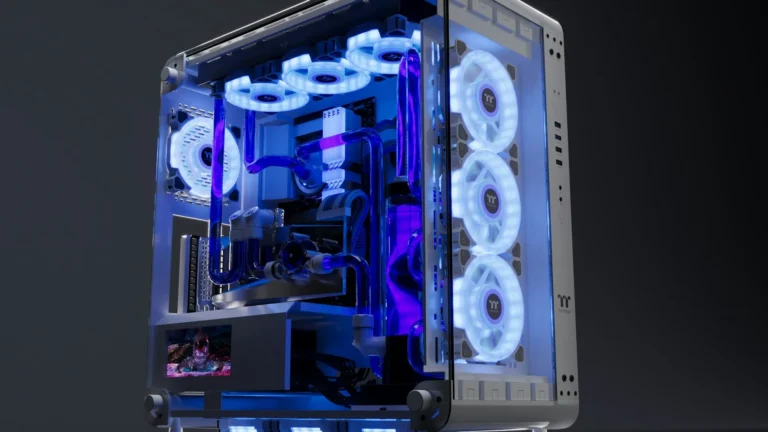Liquid cooling is usually the one thing people think of when talking about improving your PC’s performance. Though this technique may improve performance, safety and some risks (such as leakage of coolant) should be considered. In this guide, let’s uncover whether liquid cooling is safe to install on your PC, and how it can affect the safety, and longevity of your computer.
Is Liquid Cooling Safe for Your PC?
Of course, liquid cooling is safe. Dissipation of heat from the device’s processor by using a liquid generally a combination of water, sometimes with coolants, to do so. After passing through the liquid, the heat is dispersed into the air using a heat sink. High-performance smartphones and PCs such as Xiaomi POCO F3, Vivo X90 Pro 5G, and Xiaomi POCO F4 GT usually have liquid cooling systems. It ensures that the processor is cooling properly and optimizes device performance at the same time.
Can Liquid Cooling Damage the PC?
Of course, sometimes liquid cooling to PC may damage from improper installation and maintenance. To ensure the right safety and longevity, there are a few things to consider when installing and maintaining your liquid-cooled PC.
Can Liquid Cooling PC Leak?
Indeed, liquid cooling systems can leak if not put into or constantly maintained properly. However such systems are designed to use corrosion and wear-resistant materials to minimize the risk of leakage. Some liquid coolants are also nonconductive, meaning you would be less likely to damage your PC components in the case of a leak.
Liquid Cooling for Gaming — Is it Better?
While yes, liquid cooling is an advantage over traditional air cooling for gaming, whether or not it’s better too, depends on a few things. Liquid cooling is one of the major benefits that can give more than the air cooling power for liquid cooling so as to prevent the overheating of the PC components.
Should I Liquid Cool My PC?
It depends. You should Liquid cool your PC is determined by a variety of factors, including:
- Your budget and preference
- You have compatible hardware available in your system
If you’ve got an expensive rig with a high-end CPU and GPU, liquid cooling may be a good alternative to conventional air.
Wigans Risks of Liquid Cooling?
As you can see, liquid cooling has various advantages over typical air cooling, so it’s certainly a safe alternative to utilize. However, there are some downsides to installing a liquid cooling system in your Laptop that you should be aware of before you do it. Here are some of the dangers of liquid cooling:
- Leaks: By far the most worrisome problem with liquid cooling is leaks. But if the tubing or the other components of the liquid cooling system aren’t properly installed or maintained, leaks are likely, which can damage your PC components. High-quality liquid cooling systems are intended to decrease the chance of leaks, however regular monitoring and scheduled maintenance are still required to make sure everything is running.
- Corrosion: When used wrongly, a mixture of water and other additives can cause corrosion in liquid cooling systems. Leaks or decreased cooling efficiency can result from corrosion damaging the radiator, tubing, and other components of the liquid cooling system. Regular maintenance and high-quality parts will lessen the risk of corrosion.
- Compatibility issues: Not all PCs are compatible with liquid cooling systems. If you decide to go with the liquid cooling route, make sure it is compatible with your components, and that you may or may not need to alter any hardware at all.
- Cost: Excessive cost of liquid cooling methods compared to conventional air cooling systems is likely. The components themselves aren’t cheap, and depending on your needs, you might need to pay a technician to install it or put in the time to learn how to self-install and maintain it.
- Complexity: The liquid cooling systems use many more components because they include pumps and radiators as additional components existing in air cooling systems. However, they can be harder to set up and keep and therefore may be not for everybody new to PC building or who wishes to have a simpler setup.
Knowing 2 Advantages of Liquid Cooling is important.
The following are two benefits and points proving is liquid cooling safe over standard air cooling:
- Improved cooling performance: Liquid Cooling outshines air Cooling when you want to remove heat away from your PC Components. Liquid has better thermal conductivity than air and liquid can thus move heat away from your components faster and better. However, it can bring your PC to run at a lower temperature, enhancing performance and preventing overheating.
- Quieter operation: Liquid cooling systems in general are quieter than air cooling systems. Air conditioning systems pull fans to circulate the air throughout your PC components leading to noise. The second, must quieter approach, is to use water or other liquids to pull heat away from your components. If you prefer a quiet gaming/working environment this can be handy.
Is Liquid Cooling Too High Maintenance?
Liquid cooling systems are not a hard sell; they are more labor intensive than air cooling and you won’t get away with not taking care of things like proper fluid levels and making sure all your components are clean and working. In addition, if one or more of the components of a bespoke cooling system fail, you have a disastrous problem with your computer. Built means hardly any maintenance and because everything is built there is less chance of the system leaking.
How Long Does Liquid Cooling Last?
The lifespan of a liquid cooling system can vary based on numerous factors, including:
- Component quality
- System maintenance
- Frequency of usage
A good design and maintenance of a liquid cooling system can last several years before replacement or update is required.


